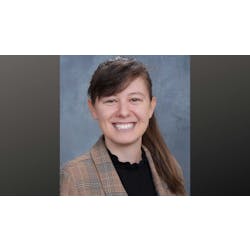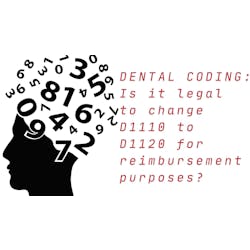By Lory Laughter,RDH, BS, MS
During much chatter recently about education accreditation, it became apparent that only a few really know what accreditation is or means, and why it is a big deal in higher education. In education, there needs to be a measure of quality assurance, especially when the credentials following a name can appear to hold so much weight in the education field. Accreditation is one way to measure and ensure standards in education.
The U.S. Department of Education (USDE) does not accredit institutions, but the Secretary of Education is required to publish a list of nationally recognized accrediting agencies who are reliable authorities on the quality of education or training provided by institutions of higher education and the programs they accredit. The Secretary of Education also recognizes state agencies that approve public postsecondary vocational education and nurse education.1
According to the Department of Education website, accreditation ensures "that education provided by institutions of higher education meets acceptable levels of quality." In my eyes, this is a very important role and a matter not to be taken lightly.
The USDE and the Council for Higher Education Accreditation (CHEA) are responsible for determining if an accrediting agency is dependable and credible. While not issuing accreditation, these agencies are somewhat like watchdogs. Recognition by the USDE is most important for a few reasons. Schools without USDE recognition cannot offer federal financial aid to students and credits earned at non-recognized institutions are often not transferable to other schools. In addition, savvy employers may not value or outright dismiss credits or degrees from non-recognized institutions.
The USDE and CHEA recognize three kinds of accreditation agencies-regional, national, and programmatic. Of course, you should first be concerned with the institution's accreditation as a whole before looking at specific programs offered.2
Regional accreditation is the highest offered, and there are seven agencies recognized by USDE for providing this accreditation. Institutions with regional accreditation are most likely to provide credits that are transferable to other universities and colleges. Regional accreditation is not a one-time process; universities and colleges must undergo periodic evaluations and reviews.
If you get a chance to ask anyone who has been a part of this review process, you will learn it is very involved. This is done to ensure the quality of education offered.
Some colleges or universities who issue degrees while unaccredited have been closed or faced opposition by states. These programs are often focused on life experience degrees or credits. These institutions can cause lasting issues for graduates and current students. One such institution is Almeda University. Almeda was accredited, but by agencies listed as providing fake degrees or diploma mills. In fact, some of the accreditation agencies offering accreditation for the school were actually created by Almeda University.
In 2012, Almeda University only had a Boise, Idaho, address and no actual location. After an investigation, the university admitted it was a "web only" institution. The university offered associate, bachelor, and master degrees utilizing "prior learning assessment' to issue credit and degrees. A complaint forum on the institution has examples of students sending in transcripts and life experience forms and receiving a diploma within a couple weeks of mailing in the tuition fee. Several graduates mentioned they were later informed the degrees were not valid and could not be used for education or employment purposes.
Almeda University was actually a corporation registered in the Caribbean Islands. The institution's accreditation and advertising came under question, and some states began ordering the university to stop issuing degrees, beginning in 2001 with Connecticut. Up to nine states warned students degrees from the school were not valid for public employment or educational purposes.
While on the surface, it could seem accreditation is not essential, but the damage to individuals can be harsh. In 2006, a Florida police officer had to return a salary increase based on a degree from the college. In 2009, eight Washington state troopers who obtained degrees from Almeda had to relinquish educational pay and in that same year at least one Sacramento firefighter had a pay raise revoked after obtaining a degree from Almeda. The fallout from fake accreditation can be costly to graduates.3
It's evident that education delivery methods are changing and adjustments need to be made for technological advances. Yet, these advances also allow opportunity for unscrupulous companies and individuals to prey on individuals attempting to earn degrees and improve employment opportunities. Accreditation by agencies recognized by the USDE is one way to help ensure academic institutions are offering degrees of substance and not promoting diploma mills. While some questionable institutions are closed by states or legal action, many remain open and the graduates who are forced to return pay, lose jobs, or are denied entrance into other institutions to further their education feel the damage.
The process of accreditation may be bogged down by tradition, and the system is definitely not perfect. But, for now, it is a way to help ensure that institutions offer programs and award degrees based on a set of standards. Without this oversight, fake degrees offered for merely a fee and no educational activity are a real risk to students, graduates, and our educational system.
You don't have to sit behind a desk for eight hours a day to obtain a good education. You do, however, need to ensure the institution or program you plan to attend meets the standards for a valid and valuable degree. For now, the best way to find that assurance is to check the USDE list of recognized accrediting agencies. My wish for everyone is an educational experience meeting your needs and desires and a path to lifelong learning that brings you to your chosen goal. Work those brains! RDH
References
http://ope.ed.gov/accreditation/
http://www.thebestschools.org/degrees/accreditation-colleges-universities/
https://en.wikipedia.org/wiki/Almeda_University
Lory Laughter, RDH, BS, MS, practices clinically in Napa, Calif. She is owner of Dental IQ, a business responsible for the Annual Napa Dental Experience. Lory combines her love for travel with speaking nationally on a variety of topics. She is also a part-time educator or consultant for American Eagle, Livionex, and Nuvora. She can be contacted at [email protected].







